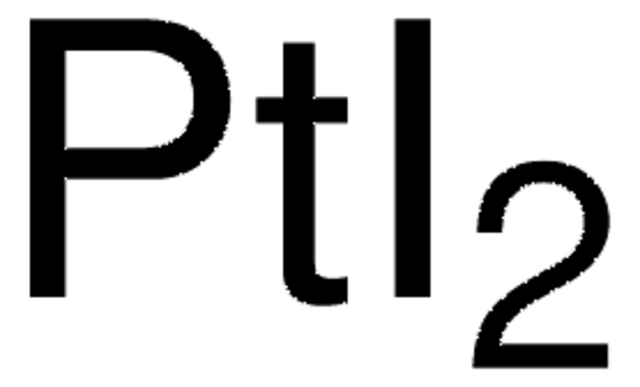206113
Platinum(IV) chloride
96%
Sinónimos:
Platinum tetrachloride
About This Item
Productos recomendados
assay
96%
form
powder and chunks
reaction suitability
reagent type: catalyst
core: platinum
mp
370 °C (dec.) (lit.)
density
4.303 g/mL at 25 °C (lit.)
SMILES string
Cl[Pt](Cl)(Cl)Cl
InChI
1S/4ClH.Pt/h4*1H;/q;;;;+4/p-4
InChI key
FBEIPJNQGITEBL-UHFFFAOYSA-J
¿Está buscando productos similares? Visita Guía de comparación de productos
Application
Due to its high affinity to the glycosyl acceptor hydroxy groups and bidentate ligation capacity, it can be used as a dual catalyst for regio- and stereoselective glycosidation reactions.
It can also be used for the photosensitization and surface modification of TiO2 for the photodegradation of 4-chlorophenol.
signalword
Danger
hcodes
Hazard Classifications
Acute Tox. 3 Oral - Eye Dam. 1 - Resp. Sens. 1 - Skin Corr. 1B - Skin Sens. 1
Storage Class
6.1A - Combustible acute toxic Cat. 1 and 2 / very toxic hazardous materials
wgk_germany
WGK 2
flash_point_f
Not applicable
flash_point_c
Not applicable
ppe
Eyeshields, Faceshields, Gloves, type P3 (EN 143) respirator cartridges
Certificados de análisis (COA)
Busque Certificados de análisis (COA) introduciendo el número de lote del producto. Los números de lote se encuentran en la etiqueta del producto después de las palabras «Lot» o «Batch»
¿Ya tiene este producto?
Encuentre la documentación para los productos que ha comprado recientemente en la Biblioteca de documentos.
Los clientes también vieron
Nuestro equipo de científicos tiene experiencia en todas las áreas de investigación: Ciencias de la vida, Ciencia de los materiales, Síntesis química, Cromatografía, Analítica y muchas otras.
Póngase en contacto con el Servicio técnico















